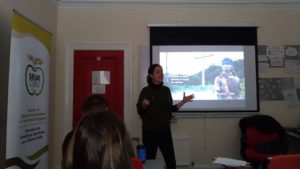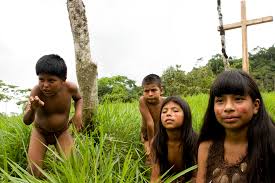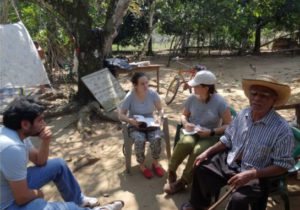Even the Rain (Icíar Bollaín, 2010), the film screened at our last CineScience in Leeds, (besides dealing with a very interesting topic about the Water War in Bolivia and the parallelism between it and the conquest of America) presents a very good opportunity to reflect on the possibilities offered by the social sciences to tackle complex socio-ecological problems.

Fig. 1 Prof Martin-Ortega during her talk at the CineScience event on Social Sciences and Environment
The film highlights the importance of the ecological economics (discipline of the social sciences) to study the relationship between human beings, their communities and neighbouring communities, and the natural environment in which they live.
Currently, the paradigm that used to assume that environmental management could be treated as a technical problem for which an “optimal” solution can be found is obsolete. Today, from the social sciences, we are more aware of the need to address environmental conflicts (such as the central theme of the film about access to water) by studying the interaction of many multidimensional factors and operating at different scales and with different degrees of uncertainty. Knowing how all the factors interact, we can find better ways to manage conflicts and minimize the impacts. The contexts in which a ‘solution’ to problems can be found are rare, but in general, we need to find “ways to manage them” to minimize the impacts and try to maintain a certain degree of equity in the distribution of costs and benefits between all those agents involved.

Fig. 2 Image from the movie “Even the Rain”
If we take a look at the way in which this film tries to narrate this conflict, it would be a mistake to interpret its content in simplistic terms. For example, we cannot assume that in this story there are very good “good guys” (indigenous people) and very bad “bad guys” (see the water company, in the current social context, as well as the “Spanish” in the historical context). The issue is much more complex and includes elements such as the clash between conflicting visions of the world and the legacy of historical processes. This type of conflict goes much further, preventing only a mere moral positioning. Therefore, this story can and must also be approached from a scientific perspective, that provided by the social sciences, and is the field of study of our guest to this session, Dr. Julia Martin Ortega, Professor in Ecological Economics.
Even the Rain exposes different issues to be addressed, such as, for example, the debate about the privatization of the water service and how this can have effects on the commercialization of natural resources or the change in mentality on how they should be managed. All this is related to issues such as efficiency in the management of resources, distributive justice, the participation of communities in decision-making that directly affect them, and thus, numerous factors that affect social policies and the relationship between human groups with nature.

Fig. 3 Field work in social sciences: Interview with members of the community in the Usumacinta Roc project in Chiapas
In summary, these are all issues that can be addressed from social sciences such as ecological economics and that allow us to have a more comprehensive vision of environmental problems, as well as help to establish mechanisms and paths that help us face the great challenges of our present and future on the planet.
By Prof Julia Martin Ortega from the school of Earth and Environment at the University of Leeds and Dr Margarita Segovia Roldán, Research Associate at the University of Sheffield. Members of SRUK-Yorkshire.
https://elpais.com/elpais/2015/07/13/planeta_futuro/1436796771_984802.html






